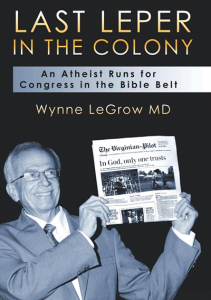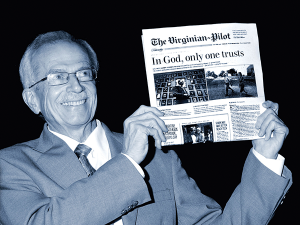Last Leper in the Colony: An Atheist Runs for Congress in the Bible Belt

BOOK BY WYNNE LEGROW
380 PP.; $19.95
A white doctor in the rural South is presumed to be a Republican and a Christian. Wynne LeGrow, a hard-working doctor in Emporia, Virginia, was neither, but he kept his political and religious beliefs to himself. He felt that his liberal political views would turn off most of his patients, and his atheism would shock almost everyone.
Last Leper in the Colony is the fascinating story of how LeGrow transformed himself from a small-town physician who shunned politics (except to vote), into a Democratic candidate for Congress. In 2010, without primary opposition, he secured the nomination for the U.S. House of Representatives, a role that brought with it many ups and downs as he tried to figure out how a political neophyte should conduct a campaign. In many ways, this book is a guide on how to run for public office—as an atheist. It offers an insightful assessment of what worked and what didn’t, illustrated by the surprising political education LeGrow got along the way.
But first a little background on the author. He grew up as a “PK” (preacher’s kid) and attended church regularly (if not faithfully) until he graduated from high school. His father, a liberal Congregational minister, never talked about God belief with his son, but noticed Wynne’s skepticism. Wynne assumed that one sermon was directed at him when his father preached that those who have doubts about religion should continue to go to church. His mother, the minister’s wife, was likely a skeptic. When young Wynne mentioned he was having trouble with the concept of Jesus rising from the dead after three days, his mother told him that Jesus’s followers probably felt his presence emotionally after he had been dead a few days, a casual and natural dismissal of that defining supernatural event for Christians.
LeGrow believes his road to atheism began at age five, when his older brother told him Santa Claus was a delusion. While some children are upset by this revelation, little Wynne was relieved because such a belief made no sense to him. (Reviewer’s note: He isn‘t the first person to view the Christian God as Santa Claus for adults.)
As he neared retirement, LeGrow became politically engaged, and it was George W. Bush who inspired him to run for office. If Bush, with his limited intellect and insight, could become president of the United States, LeGrow thought he could certainly be a congressman. He naively assumed a high correlation between intellect and electability. After a brief and unsuccessful attempt to win the Democratic primary in 2008, LeGrow tried again in 2010 and became Virginia’s Fourth Congressional District nominee running against incumbent Republican Randy Forbes.
The contrast couldn’t have been more stark. LeGrow was a traditional progressive, except that by now he was an open atheist. Forbes was not only a traditional Christian conservative, but also founder and chairman of the Congressional Prayer Caucus. Forbes asserted, “The concept of separation of church and state was not borne to establish freedom from religion, but to establish freedom for religion.”
In addition to advice from his trusted wife Marilyn, LeGrow knew he needed to learn from political operatives how best to conduct a campaign. He was told that any day he didn’t spend six to eight hours calling people for money would be wasted time he couldn’t make up. LeGrow much preferred discussing issues. However, one event was even more uncomfortable for him than fundraising—a women’s fashion show where he tried to make small talk. (I can identify with his
discomfort.)
This story and others like it are in the book’s funniest chapter, “Bumps in the Road.” Some of those bumps were more like boulders. For instance, LeGrow had a good feeling he could get a major contribution from a rich, elderly man who seemed sympathetic to the cause. So he phoned the gentleman, only to learn that his potential donor was dead.
 It was difficult to find experienced campaign staff, partly because of his small budget and partly because he was an open atheist. He hired eighteen-year-old Gabe Butler as his campaign manager. One of Butler’s top priorities was getting business cards printed with his name on them and the title “Campaign Manager.” A local newspaper interviewed him as LeGrow’s “teen campaign manager,” and displayed a picture of Butler but not LeGrow. Overall, the campaign manager got more publicity for himself than for his candidate, so Butler, along with several other less-than-competent hires, was let go as the campaign limped on.
It was difficult to find experienced campaign staff, partly because of his small budget and partly because he was an open atheist. He hired eighteen-year-old Gabe Butler as his campaign manager. One of Butler’s top priorities was getting business cards printed with his name on them and the title “Campaign Manager.” A local newspaper interviewed him as LeGrow’s “teen campaign manager,” and displayed a picture of Butler but not LeGrow. Overall, the campaign manager got more publicity for himself than for his candidate, so Butler, along with several other less-than-competent hires, was let go as the campaign limped on.
Eventually LeGrow assembled a fairly capable team. His staff preferred that he hide or downplay his religious views, but LeGrow wanted to be honest about who he was, exemplifying the important point that many people are good without God. At times, he couldn’t convince people he was an atheist. When LeGrow told one supporter that he wasn’t religious at all, the constituent said it was OK because “we all believe in God.”
Especially disappointing was the reaction of the district’s African-American Democrats in office. Despite agreeing with LeGrow on most issues, many refused to promote him within the larger African-American community because of his open atheism.
LeGrow’s stump speech was initially awkward as he talked only about issues, but he soon learned the importance of telling personal stories. He would say, “I practiced medicine in Emporia for twenty-nine years. I was a nephrologist, a kidney doctor. One of the most difficult things you have to do as a physician is give people bad news about their medical condition.” He then gave examples, and pointed out that a physician also has to give people hope. This provided the segue, “If I am elected to Congress, I will be honest with my constituents. We have serious problems in this country, but we can address them rationally.” He would then talk about problems like global climate change and inadequate education, and how he hoped to tackle them.
There was a cat-and-mouse game between LeGrow and Forbes, with the mouse escaping every time. Forbes gave different excuses for avoiding debates. He would repeatedly misrepresent LeGrow’s position and accuse LeGrow of attacking him for being a Christian. LeGrow answered that he had no problem with Forbes promoting his religion, but not as a government official. He criticized Forbes for trying to slip in legislation that included “The holy Bible is God’s Word.” A debate scheduled months ahead of time by the League of Women Voters had to be cancelled because Forbes suddenly couldn’t fit it in.
LeGrow hoped that his opponent would want to debate an atheist and gain national publicity as a defender of the faith, but Forbes didn’t want to give him any media attention. Nate Silver, the statistician who handicaps races at ESPN’s FiveThirtyEight blog, initially placed LeGrow’s chances of winning at 0 percent. After stories about his atheism broke, his chances shot all the way up to 0.1 percent on the site.
The bad news is that Dr. Wynne LeGrow lost the 2010 election. The good news is that he garnered 37.5 percent of the vote, more than any Virginia Democrat running against any incumbent Republican that year. LeGrow can be proud of the way he conducted his campaign, and proud of the honest, perceptive book he’s written about it. I’m happy to recommend it as a good read written by a good man with a good cause. I hope the book will inspire more open atheists to seek public office, encouraged by words of wisdom from the Last Leper in the Colony.
